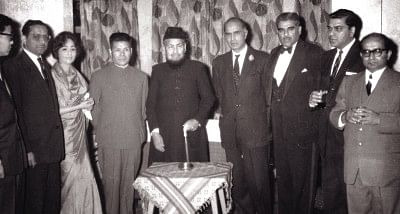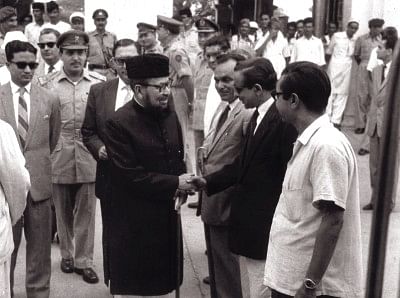|
In Retrospect
A Forgotten Hero
Razia Khan
My ancestors came to Bengal with Akbar's army in order to subjugate the rebellious province. The green terrain cast a spell on them and they settled in the village known as Khankhananpur. Apart from agricultural land, they had the leasehold of two large markets. Our ancestral home was washed away by the turbulent river Arial Khan leaving the family in dire straits. Years of struggle brought my father M. Tamizuddin Khan to Scottish Church College, then Presidency College in Calcutta. He took his MA and Law degree from Calcutta University. He and his friends had vowed not to enter government service being ardent Congressites and Non-cooperation participants.
The death of CR Das weakened Hindu-Muslim unity and he joined the Muslim League from the Legislative Assembly, he moved to the Bengal cabinet twice as Education and Health Minister. Before partition he became a member of the Constituent Assembly in Delhi. Moving to Karachi after partition he was first appointed as Deputy Speaker -- and then speaker and president of the Constituent Assembly after the death of Md Ali Jinnah. While serving the second term as speaker he died in 1963.
 |
| At a dinner in honour of the Chinese Commerce Minister (left) July, 5, 1963. |
Being dedicated to the concept of Pakistan he promoted the cause of national integration as a result of which he supported the inclusion of Urdu along with Bangla when martyred MD Dhiren Dutt proposed Bangla as the future state language of Pakistan. The assumption that he opposed Bangla is a fallacy. Like many past politicians he was loyal to Pakistan. What his role would have been had he seen the genocide of '71 is a matter of sunrise. I only believe that he would not betray his own people. Once, when in Karachi I put on our national song Sonar Bangla - he stopped near my door listening intently - Tagore's patriotic declaration seemed to have captured his soul. During his last illness in Islamabad he told Ayub Khan: "I want to die in my own soil”. The army dictator complied with his wish and sent him to Dhaka by a military plane. He was buried with full state honours in the National Assembly (now Jatya Sangsad) precincts. His simple mausoleum was designed by Louis Kahn to keep the architectural harmony of the place.
His life is the story of struggles and triumphs. Never sermonising or bossing over anyone, he kept a low profile, forbidding us to misuse government paraphernalia, constantly reminding us that the many luxury items would disappear as soon as he left the cabinet speakership. Returning from England after attending the queen's coronation or meeting President Kennedy he donned his lungi and kurta and sat at the dining table without a single word about his visits. In a dairy lost from our house in London, he recorded intimate and humorous exchanges with Lord Attlee. When I took my English M A degree from the British Prime Minister I knew he could not have guessed that I was the daughter of a man he had met.
 |
| The Acting President of Pakistan, Tamizuddin Khan being greeted by Yusuf A. Ismail as he leaves for Rawalpindi at Cantonment Railway Station on September 15, 1962. |
From two years in the British jail he contracted serious intestinal trouble. Never a doting or pampering parent, in his home I enjoyed the dignity and privacy which every individual deserves. Though a rebellious, impulsive, angry young person - I was allowed to be my own very self. He never raised his voice at me although I must have caused him pain by my actions. The only joy I brought him was when I stood first in my English Honours bagging the Pope Gold medal for English literature. The second time was when my son Kaiser Tamiz was born. Knowing perhaps that his own property could be grabbed by usurpers he gave me a unique gift- a piece of land on which my house stands with its fruit trees. All that I ever gave him was a mohair buff-coloured scarf I sent by post to him from England. He also respected my individuality which is basically non conformist and radically different from his. He was loyal to the concept of Pakistan, I had no faith in it. But I shared with him his courage and spirit of independence.
A man of few words he had perfect knowledge of parliamentary procedures, never jumbled or used dialect when the assembly was in session. His written English was immaculate, his spoken English had a native twang. His insistence on dying on his own soil proves that he was a Bangali and in the final hour rejected Pakistan as his true home.
Copyright
(R) thedailystar.net 2010 |
